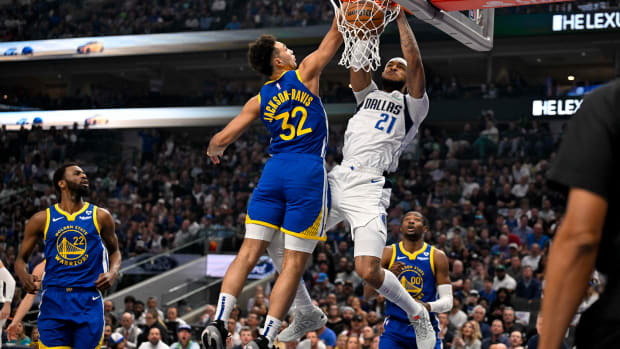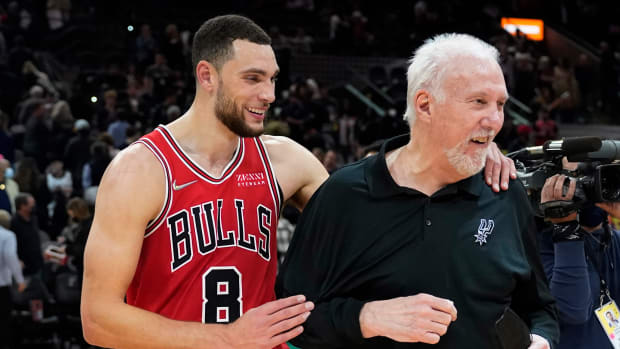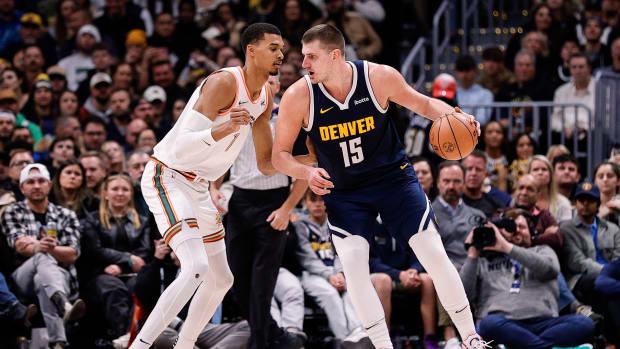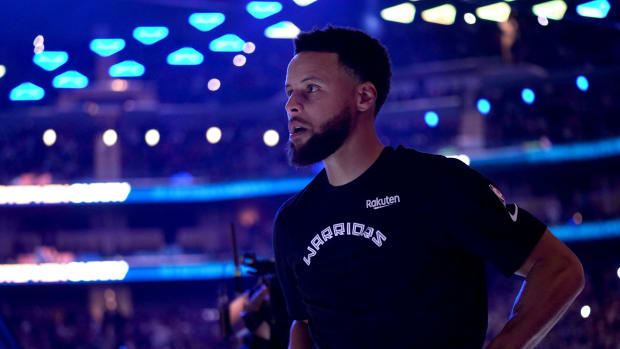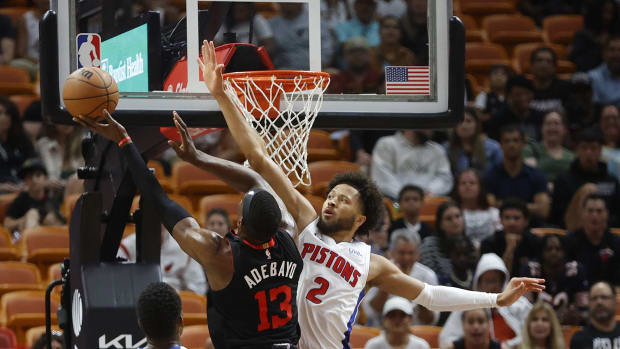The Long March: Emmanuel Mudiay's journey from Congo to the NBA
This story appeared in the June 22, 2015 issue of SPORTS ILLUSTRATED. To subscribe, click here.
You have reached your limit of 4 premium articles
Register your email to get 1 more
New York City is home to thousands of restaurants, delis and food trucks, a veritable buffet for a hungry 19-year-old. What'll it be, Emmanuel Mudiay? "There's a Subway down the street," he says. Well, O.K. It's mid-May, and the 6'5", 200-pound Mudiay is stuffed into a second-row seat in a silver van crawling through Midtown traffic. He doesn't mind the congestion—in Guangdong, the province in southern China where he played last season, it's far worse. There, he rarely traveled by car. He biked for a while, until he saw the body of another rider who had been killed in a hit-and-run. "After that," he says, "I was walking." Mudiay is in Manhattan for the NBA's draft lottery, a drawing of Ping-Pong balls that has turned into a widely watched and irresistibly suspenseful event.
Behind Emmanuel sits his oldest brother, Stephane, 26, the family patriarch. Their father, Jean-Paul, died in 1998, in Kinshasa, the Democratic Republic of the Congo (formerly Zaire). One afternoon, before he headed to a barbecue, he told Stephane, then eight, to mind his mother and two brothers. "Same thing he said every time he went out," says Stephane. Only this time he wouldn't come back. Hours later Jean-Paul collapsed, and his head struck a table. He died on the way to the hospital. The official cause of death, the family says, was a heart attack. Suddenly Stephane was the man of the house. "I don't think it's something he tried to be," says Emmanuel, "but he was who we looked up to."
Up front in the van is Jean-Michel, 23, the middle child. Basketball runs in the Mudiay family. Stephane was a 6'7" small forward at Trinity Valley Community College in Athens, Texas, then at Texas Wesleyan in Fort Worth. Jean-Michel played two years at Western Texas College in Snyder before transferring to SMU in 2013. He knew why the Mustangs wanted him: for an edge in recruiting Emmanuel. Jean-Michel didn't care. A 6'3" guard, he rode the bench for two years and, last month, graduated with a degree in sports management.
• MORE NBA: Mudiay falls out of top five in Mock Draft 4.0 | Team needs
Emmanuel's brothers are his team. His posse. Where Emmanuel goes, they go, including on his first official trip as a potential NBA draftee. The league loves parading its top prospects around New York City during lottery week. Players willingly pay for their flights and hotels; it's a cool experience, and hey, you don't want GMs thinking you're a diva.
Mudiay especially. A year ago he was a hot prospect, a powerful playmaker who recalled the young Baron Davis. He was headed to SMU to play for Larry Brown, the point guard whisperer. Mudiay (MOO-dee-ay) is still a top talent—he is projected as a high lottery pick on June 25—but one with questions that many league executives are scrambling to answer. He left for China as the potential No. 1 pick; now he's battling 6'5" D'Angelo Russell of Ohio State to be the first guard drafted. So, after ducking into the Subway on 54th Street, he folds his frame into a back table, takes a bite out of his sandwich and begins a complicated story.
In the late 1990s, the Mudiays' homeland was a battleground in a bloody African war. Rwanda, a small country on its eastern border, invaded Zaire in '97, sparking a conflagration that would involve 10 nations. The country's rich natural resources—minerals and timber—were looted. Reports of rape, dismemberment and murder were widespread. Over the next nine years an estimated 5.4 million people died in the conflict and its fallout, according to the International Rescue Committee.
Top 10 sleepers in the 2015 NBA draft
Kinshasa, Congo's capital and largest city, was a flashpoint. Stephane and Jean-Michel remember the charred, rotting corpses of people who had been girded by tires and burned alive. They remember the bullet-riddled bodies. They remember the pop of rifles and the rat-a-tat-tat of automatic weapons at night. Once a stray bullet tore through one of their windows, clipping a relative in the shoulder. "I try not to think about it," says Jean-Michel, his voice trailing off. "Those images are hard to forget."
Therese Kabeya was born in Kinshasa. She met Jean-Paul Mudiay in Canada while he was at the University of Montreal and she was attending a nursing school nearby. In 1987 they moved back to Zaire, married and started a family. Jean-Paul worked as director of marketing at a publicly owned transportation company; Therese stayed home and raised their three boys.
After Jean-Paul's death Therese faced big decisions. Kinshasa was not safe. Because of the violence, schools were closed for days, even weeks, at a time. In 2001 she decided they would move to America. "We couldn't go on like that," Therese says. "We needed a better life."
The logistics were tricky. Therese could go to the U.S. and request asylum; her sister Christine lived in the Dallas area. Therese's sons, though, would have to stay behind. Once in the U.S. she could petition to bring them over, but the process could take two years. "I talked to [the kids]," she says. "They understood a little. I told them I am going to America. I am going to make a better life."
The boys moved in with their paternal grandparents. Therese, unable to get a nursing license in the U.S.—"I didn't speak English," she says—took a job as a nurse's aide at an assisted living center in Arlington, Texas. Later she took a similar position at a hospital. She called Kinshasa every day. Some days she got through. A little over a year after she immigrated, the paperwork came through: Her sons could join her in the U.S.
Congo's national sport is soccer, but Stephane gravitated toward basketball—and his brothers followed suit. In the U.S., Stephane and Jean-Michel played daily. Stephane was strong and physical in the mold of a power forward; Jean-Michel was smoother, more athletic. Emmanuel desperately wanted to join them. He believed he could excel; in second grade he wrote a letter to his mother in which every line read, I am going to play in the NBA. "He would cry when we wouldn't let him play," says Stephane. When they did, they were merciless. In the back of the family's apartment building was a half-court surrounded by a chain-link fence. The Cage, the boys called it, where basketball mixed with MMA. Elbows flew. Every foul bordered on flagrant. Many times Emmanuel would chase a loose ball only to be body-checked into the fence. "You know how in wrestling they have Hell in the Cell?" he says. "This was kind of like that."
2015 NBA draft: Needs for every team
Those beatings didn't last. As a teenager Emmanuel matured quickly. He blended Stephane's strength with Jean-Michel's athleticism, and his natural skills were superior to theirs. By the eighth grade Emmanuel was attending camps with Russell and Jahlil Okafor and dominating. As a freshman he played for Grace Prep in Arlington and in the TAPPS Class 4A final he scored 16 points—14 in the second half—to help defeat Houston Westbury Christian. As a junior he followed his coach, Ray Forsett, to Prime Prep Academy, a group of charter schools in Dallas, Fort Worth and Oak Cliff founded by NFL Hall of Famer Deion (Prime Time) Sanders. Emmanuel led Prime to a 37--2 record and the semifinals of the National High School Invitational.
Every college wanted him—Kentucky, Kansas, Oklahoma State, Baylor. Stephane fielded most of the coaches' calls. One came from Larry Brown. "He said, 'I know we are probably not going to get him, but I want you to know we want him,'" says Stephane. ("He blew me away with his size, his athleticism and an unbelievable feel for the game," says Brown. "He reminded me of John Wall. He defends, he rebounds, he can handle a press. He could have played for some NBA teams in high school.") Emmanuel wanted SMU, too. It was close to home. Jean-Michel was there. In the summer of 2013, Emmanuel committed to the Mustangs.
Problems surfaced in 2014, toward the end of Emmanuel's senior year. Since opening in '12, Prime Prep had been plagued by allegations of academic misconduct, underfunding and poor living conditions. In July '14 the Texas Education Agency, after an eight-month investigation, announced it would move to revoke Prime Prep's charter, and in January the academy closed.
Eligibility issues followed Prime Prep's athletes. In 2013 the NCAA ruled LSU forward Jordan Mickey and TCU center Karviar Shepherd ineligible due to academic problems at Prime; the two appealed and were reinstated. There was never a formal accusation against Mudiay, but he feared that the NCAA would declare him ineligible, too, jeopardizing what would likely be his only college season.
In July 2014, days before he was scheduled to enroll at SMU, Mudiay told Brown he wasn't coming. His college career was over before it started.
The Case For: Why NCAA basketball is the best route for future NBA players
The plane descended from the pitch-black sky toward Emmanuel Mudiay's new life. It was a cool late September night in Guangdong, the province Mudiay would call home for the next six months. The Guangdong Southern Tigers, one of the premier teams in the Chinese Basketball Association, had signed him to a one-year, $1.2 million deal. CBA teams rarely pursue U.S. high school players, but months earlier Tigers coach Du Feng had flown to Texas to watch Mudiay work out. He liked what he saw. "I needed a tall point guard," says Du. "His upside [was] good." When Mudiay landed in Guangdong, there was a message on his phone. "It was around 10 p.m.," says Mudiay. "They wanted to know if I wanted to practice tomorrow."
Mudiay had resisted playing in China. "Hell no was my first response," he says. But Guangdong offered him a chance to support his family. For years Mudiay had watched his mother work 10-hour days. He wanted her to stop, so he took the best offer he had. Therese quit her job and moved to China with him. Stephane, too. The Tigers rented the family an apartment in a high rise five minutes from their arena.
China, predictably, required adjustments. Two-a-days every day. Weights in the morning, skill work in the afternoon. The game there was more physical. Mudiay competed mostly against grown men—Yi Jianlian, an NBA lottery pick in 2007, was one of his teammates—and referees were more reticent with their calls. Once, early in the season, Mudiay was clotheslined. No whistle. "Totally different level of physical play," he says.
Off the court Mudiay became a homebody. There was an English pub nearby, but no other place served Western food. In Guangdong "the food was like the Chinese food we have [in the U.S.]," says Stephane, "without the taste." His mother cooked lots of chicken and steak. Friends sent care packages filled with snack bars. On weekends Emmanuel would binge-watch NCAA games and NBA documentaries, absorbing everything: from Michael Jordan, how practices should be harder than games; from Charles Barkley, how to be indifferent to public opinion.
Mostly he worked. He went to the gym, he says, "all day, every day." When he wasn't practicing with his team, he was playing one-on-one with his cousin Daniel Ehambe, who had also accompanied him to China. "He had a good work ethic and attitude," Du says of Emmanuel. "I spent a lot of time coaching him one-on-one. He worked very hard to gain experience. He worked hard to meet his expectations and improve. I really cared about him. The team really cared about him, too."
Knicks, Cavaliers among NBA teams facing biggest off-season decisions
The atmosphere was less inviting. Smoking is permitted in arenas in China. The thin cloud before games thickened by halftime, so Mudiay held his breath from the locker room to the floor. Some teammates, he says, smoked in the bathroom before games. One of them played drunk. "It was crazy," says Mudiay. "He was one of our best players." (Du claims smoking was "totally prohibited" by teams and drinking was not allowed during the season.)
Then, misfortune: In the Tigers' 10th game Mudiay sprained his right ankle. He missed the next three months. Du offered to let him go home; Mudiay declined, wanting to play. In March, as Guangdong trailed archrival Beijing (led by former NBA All-Star Stephon Marbury) 2--0 in the best-of-five playoff semifinals, Du asked Mudiay if he was ready. "I was at about 90%," Mudiay says. Though rusty, he had 24 points, eight rebounds and four assists in a Tigers win. The series—and Mudiay's season—ended two nights later, but he had deepened his teammates' respect.
So: If Du had a do-over, would he still take the young American? "I would," he says. "His gifts are rare. If he doesn't play in the NBA and wants to play in the CBA, I will be the first to sign him."
The fog rolls off the hills in California's San Fernando Valley, creating a soupy chill on the sprawling campus of Chaminade College Preparatory School in West Hills. It's late May, and Mudiay sits against a wall outside the gym, legs splayed, head buried in an iPhone. He shuttles between Chaminade and Proactive Sports Performance in Westlake Village, running through basketball drills with noted trainer Joe Abunassar at Chaminade and strength training at PSP. Abunassar says the injured ankle has healed—Mudiay gets therapy on it three days a week as a precaution—and his drills are aimed at maximizing the player's superior size. Pick-and-rolls. Dribble handoffs. Post moves. In fewer than three months Mudiay has packed on 11 pounds of muscle, and his single-leg explosion has improved by 31%. "When he gets past a defender, his body becomes an asset," says Abunassar. "Look at Chris Paul. He gets a defender on his butt, and he can steer him. He shortens the distance to the basket. Emmanuel has that potential."
Mudiay skipped the draft combine last month; individual workouts are most teams' only opportunity to get a look at him. The clubs with the top four picks—the Timberwolves, Lakers, 76ers and Knicks—are all interested. After an injury-riddled year in China, executives are eager to see the once-heralded prospect in action. "His body of work there was too small to make a bold prediction on what he is going to be," says Ryan Blake, senior scouting consultant to the NBA. "He's high risk, high reward."
To most teams, the games Mudiay did play in China mean little. "It's terrible competition," an Eastern Conference GM says of the CBA. "Everyone's stats are inflated. Look at what Andray Blatche is doing. [During the 2014--15 season Blatche averaged 31.1 points, 14.6 rebounds, 5.1 assists and 2.8 steals for the Xinjiang Flying Tigers.] Summer-league games are better. [Mudiay] is a great talent, but that year was almost a wasted year."
Such questions don't bother Mudiay. Why would they? His future is much brighter than his past. He thinks about Stephane. "He has sacrificed so much," says Emmanuel. He thinks about Jean-Michel, who spent the holidays last year alone, at SMU, his family a world away. He thinks about his mother, who came to the U.S. with nothing and has seen two sons graduate from college and soon will watch another play in the NBA. He thinks about his father.
Recently Emmanuel asked his mother for a picture of Jean-Paul that he can take to his next stop. He never had one before. "Thinking about him is tough," says Emmanuel, "but he would be happy for us. He would be proud."

































